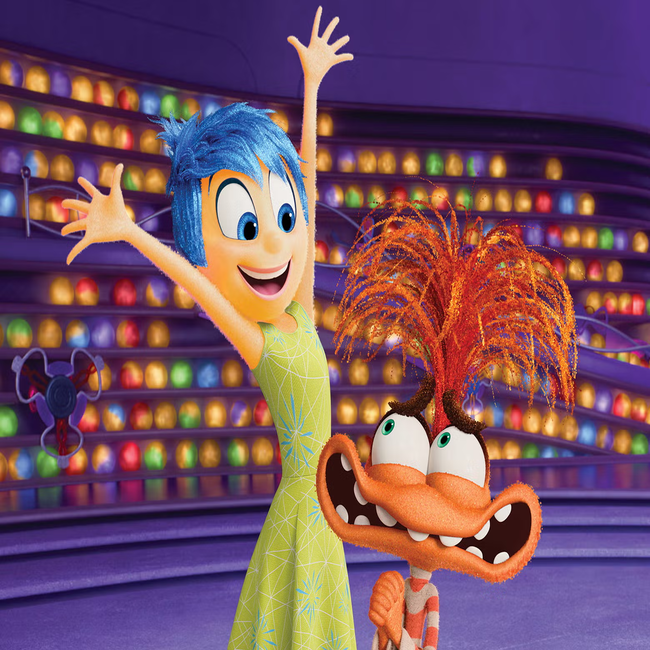Unpacking Anxiety: The Emotion That Tries to Protect Us
(Spoiler Alert – Inside Out 2)
In Inside Out 2, Pixar does what mainstream Psychology often struggles to do…. it gives emotion a voice. And in one particularly tender scene, Joy speaks directly to Anxiety. Not as an adversary to be conquered, but as a part of Riley that once wanted to protect her. The message is clear: Anxiety, at its core, is not the villain. It is a bodyguard albeit an overzealous one.
In the counselling space, this becomes painfully evident. Self-help books, Instagram quotes, and motivational reels often tell us to let go of fear, embrace uncertainty, trust the process. It sounds lovely. But real life, real children, and real emotions are messier. The terrain is not linear. And no amount of advice can fully tend to an inner world shaped by unpredictability. To truly support children through anxiety, we must do something few systems are trained for: we must sit with the irrational.
A few years ago, a student went on her first school trip abroad. It should’ve been a joyful milestone …new landscapes, new friendships, new challenges. But for this child, it came with a price. She fell sick early in the trip. Her friendships faltered. And the unfamiliarity of it all… the hotels, the peer dynamics, the absence of her family became overwhelming. She returned from the trip physically fine. But something had shifted. Weeks later, she was still anxious. Months later, the anxiety had stopped being situational. It was now chronic. She was no longer reacting to a specific trigger …instead, she was constantly scanning her world for possible ones. Her body refused to switch off. Her mind raced at night. Her thoughts circled like a hawk above a field — waiting for any sign of danger. It took time, but eventually the deeper truth emerged: anxiety had become her safety net.
What once felt like a problem to be eliminated had become a strategy for staying prepared. Her logic, though hidden under layers of emotional reflexes, was this: If I stay alert, I’ll never be caught off guard again. If I expect disappointment, I’ll never be shocked by it. If I worry enough, nothing bad can truly surprise me. This isn’t rational. But it makes perfect emotional sense. Her body, in the absence of emotional safety, had built a system of internal surveillance. Like many others, she became trapped in this loop …where anxiety feels awful, but letting go of it feels worse. Because without it, she would have to accept that life is unpredictable. That not everything can be prepared for. That even airplanes, with all their checks and technologies, sometimes crash. The emotional logic of anxiety is this: it tries to save you from the unknown. But in doing so, it steals your ability to feel safe in the known.
Why Pure Logic Fails
Traditional Psychology , atleast the surface-level variety often views anxiety as a symptom to be “treated.” Breathe more. Think positive. Face your fears. But for those who live inside this constant hum of threat detection, these approaches often fall flat. They bypass the emotional roots.What anxiety often needs isn’t a solution it needs witnessing. It needs someone to sit beside the child and say: I see why your body is doing this. It makes sense. Let’s try to find safer ways now.Only once the underlying emotional logic is understood can the anxiety begin to loosen its grip. You can’t yank anxiety out of a body that still believes the world is dangerous. First, you must help the body feel safe again.
In a World Obsessed with Certainty, Anxiety Makes Sense
We live in a world that prizes control. We plan, we insure, we micromanage, we schedule — not because we’re unwise, but because somewhere deep down we all know: life is unpredictable. And that terrifies us. But for some, especially children without the emotional scaffolding of stability, this fear becomes a lifestyle. It becomes anxiety. Not as an overreaction but as a deeply intelligent survival adaptation. In professions like law enforcement, emergency response, and even bureaucracy, hypervigilance is often rewarded. In children, we pathologize it. But it’s the same core response: stay ahead of the threat so it doesn’t consume you.
What does this mean for those of us raising, teaching, or caring for children? It means we must stop trying to "fix" anxiety without first understanding it. We must teach children that anxiety is not a personal failure. It is not madness. It is not weakness. It is a loyal if slightly misguided friend trying to help them stay safe. Eventually, with patience and relationship, we can help them retire that friend. We can give them the emotional vocabulary to name their inner world. We can teach them that control and safety are not always the same thing. And most importantly, we can help them return …. gently, slowly to the present moment. In the end, the present is the only place where life is truly lived. Anxiety, for all its cleverness, can’t protect us from life it can only distance us from it.
Ms Meghna Joshi
Psychodynamic Counsellor
The Indian School















